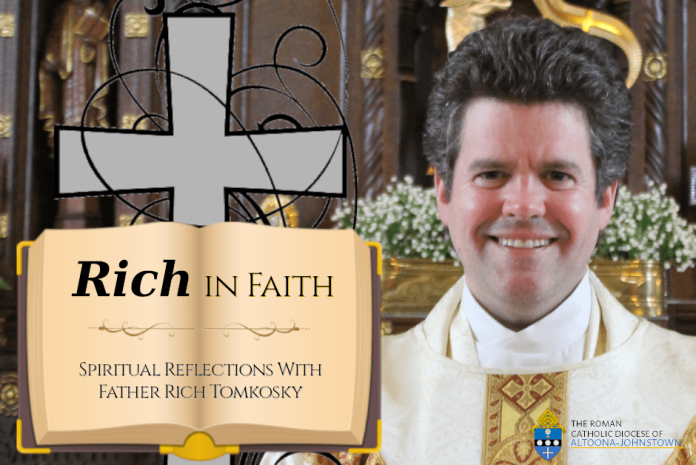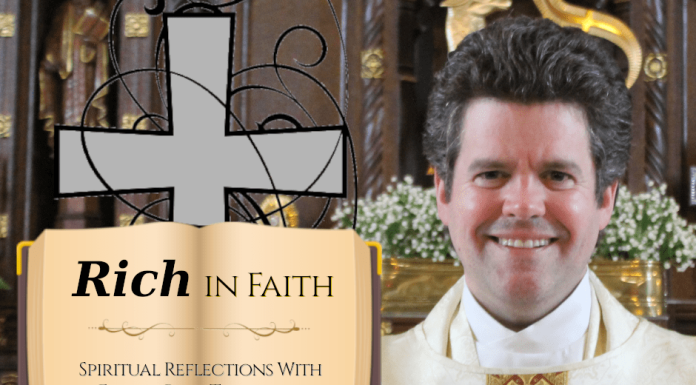By Father Rich Tomkosky
Last week we reflected upon some of the more challenging teachings of Jesus, letting go of anger, being pure in both mind and body, being honest in our speech, and his clear and direct teaching on marriage and divorce. Now, we reflect on a few more challenges from our loving Lord.
“You have heard that it was said, an eye for an eye and a tooth for a tooth. But I say to you offer no resistance to one who is evil.” And then Jesus gives us an example – if someone strikes you, don’t strike them back. Is He saying we are to be a doormat or a punching bag figuratively or literally for others? The Church and the saints who are our models of heroic Christian living have never understood it that way. The Lord is saying break the cycle of anger, hatred and violence. The only way you can do that is when someone does something evil to you to not to return the favor. And when you resist evil by a conscious choice, peace flows into your soul. Try it and you will see it is true! It’s not easy on a human level since our natural reaction when someone does something mean or hateful toward us is to return the favor and maybe give them a little extra to convey the message: don’t mess with me! Remember the teaching in the Old Testament of an eye for an eye and a tooth for a tooth was God’s way of putting limits on revenge, for the pagan understanding was if someone did a bad thing to you and your family, you returned the favor many times over. One of my seminary professors said it was like if someone attacked a family member or destroyed your property or burned down your house, when you found out who did it, you would go with your kinsmen and burn down/destroy their whole village and kill many if not all of them who attacked your family. So, you see God in the Old Testament was trying to change the mentality of the Israelites to try to morally mature them in some elementary way, but now Jesus is taking it up to a much higher level. Yes actions, but even thoughts, need to change to reflect God’s holiness and generosity, and we must always counter evil with goodness.
Jesus goes on to say: “You shall love your neighbor and hate your enemy. But I say to you, love your enemies and pray for those who persecute you, that you may be children of your Heavenly Father, for He makes sun rise on the bad and the good, and causes rain to fall on the just and the unjust.” Is Jesus saying that God doesn’t care if one is just or unjust, good or bad? No, in the end we will all give an account of our life to God and will be either rewarded or punished for our earthly deeds; however, in this life God gives everyone a chance to repent and change for the better to the day they die. As Jesus says, “If you only love those who love you what merit is there in that?” The true test of Christian love is how we deal with the people we don’t particularly like or who in turn don’t care for us. Do we pray for the people who give us a hard time, or who have been mean to us or unjust to us in some serious way during our lifetime? Do we try to counter evil with goodness? Remember we don’t have to like everyone, but in Christ we must love everyone, which means we want what is best for them in God. This is why Jesus says we MUST pray for our persecutors and enemies. By praying for them, we are asking God to help them and change them for the better, just like we should be praying God does the same for us – since we are not always the “gift to the human race” we think we are, as a relative of mine would say.
“Be holy, for I, the Lord, your God, am holy.” This is what everything we have been reflecting upon boils down to. We are called to be like our God: faithful in our commitments, generous in forgiveness and helping others, honest in our speech, patient and kind in our thoughts, pure in mind and body as we are temples of the Holy Spirit purchased by the blood of Christ, as Saint Paul relates in the second reading this past Sunday. Most of us know this to be true in our minds – the struggle is putting it into practice in daily life. To love your neighbor as yourself means we have a proper love for ourselves. Not too much – that is arrogance and pride and conceitedness and vanity; not too little – that is denying our dignity as a child of God. Proper love of self means we recognize we are loved by God despite our sinfulness and weakness, and because of that we are called to be better in Christ, and we should want the same for others. May the Lord help us to daily live this.
Father Rich Tomkosky is the Pastor of Saint Thomas the Apostle Parish in Bedford and the Pastor of Seven Dolors of the Blessed Virgin Mary Parish in Beans Cove.































